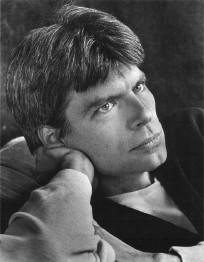 An email fluttered into my inbox yesterday afternoon, advertising a reading that night by the novelist Richard Powers, a “talk-piece about literature, empathy, and collective forgetting in the age of blogs.” Powers is on a short list of American novelists who write convincingly about how technology affects our humanity – see, for example: Three Farmers on Their Way to a Dance, on the mechanical reproduction of art; Galatea 2.2, on artificial intelligence; Ploughing the Dark, on virtual reality and collective imagination – and I’ve been wondering about the problem of forgetting, so I wandered over to the Morgan Library, curious to hear what he had to say.
An email fluttered into my inbox yesterday afternoon, advertising a reading that night by the novelist Richard Powers, a “talk-piece about literature, empathy, and collective forgetting in the age of blogs.” Powers is on a short list of American novelists who write convincingly about how technology affects our humanity – see, for example: Three Farmers on Their Way to a Dance, on the mechanical reproduction of art; Galatea 2.2, on artificial intelligence; Ploughing the Dark, on virtual reality and collective imagination – and I’ve been wondering about the problem of forgetting, so I wandered over to the Morgan Library, curious to hear what he had to say.
There’s always room for trepidation about the old guard confronting the new – one remembers the embarrassingly malformed web address that figures in at least the first edition of Don DeLillo’s Underworld – but Powers didn’t disappoint: his piece, entitled “The Moving Finger,” nicely conveys how blog-reading works, and in particular the voyeur-like experience of being caught up with an individual voice. Speaking in the first person, Powers recounted the story of a novelist obsessed with a blog entitled Speculum Ludi, helmed by someone who calls himself Funes the Memoirist, whose ranting posts on the deeper meaning of mirror neurons and advances in cognitive neurobiology were quite ably read by the critic John Leonard. Powers finds Funes’s blog by accident, then follows a common blog-reading trajectory: he doubts its credibility, finds himself compelled by the turns of phrase, sleuths down who must be behind it, lingers over his RSS reader, waiting for updates. And then he’s caught: Funes eventually realizes that he has only a single reader and calls him out by IP address. Powers panics; Funes retaliates by shutting down his blog & erasing all traces of it from the Internet. (This last bit might be where Powers goes too far.)
There’s a weird sense of intimacy that comes from reading blogs. When we read a novel, we know exactly where we stand with respect to the author; what’s in the book is packaged and done. A blog goes on. While I’m sure Powers’s piece will end up in print sooner or later, it makes sense as an oral presentation, leapfrogging the solidity of written language into the memory of his listeners. (And from there to the inevitable blog reports: see Ed Park’s and Galleycat’s). There’s an echo of this in Powers’s widely discussed writing method: he composes via tablet PC and dictation software, bypassing the abstraction of the keyboard altogether.
 But that said, it would be a mistake to read Powers as championing the new at the expense of the old. There’s been a great deal of worry of late about litblogs killing off newspaper book reviews; naturally this came up in the discussion afterwards. Powers pointed out that while there’s an enormous amount of potential in the pluralist free-for-all that is the blogosphere, online criticism isn’t free of the same market forces that increasingly dictate the content of newspaper book reviews. Amazon.com maintains what’s probably the biggest collection of book reviews in the world; Powers wondered how many of those reviews would be written if the reviewers weren’t allowed to declare how many stars a book merited. There’s something tempting about giving an under-appreciated book five stars; there’s equally tempting about bringing down the rating of something that’s overrated. But this sort of quick evaluation, he argued, isn’t the same thing as criticism; while all books may be judged with the same scale in the eyes of the market, rating a book isn’t necessarily engaging with it in a substantive way. The reciprocity in web reading writing is fantastic, but it comes with demands: among them the need for equitable discourse. Criticism is communication, not grading. Powers’s narrator fails because he refuses to be critic as well as reader. We may all be critics now, but there’s a responsibility that comes from that.
But that said, it would be a mistake to read Powers as championing the new at the expense of the old. There’s been a great deal of worry of late about litblogs killing off newspaper book reviews; naturally this came up in the discussion afterwards. Powers pointed out that while there’s an enormous amount of potential in the pluralist free-for-all that is the blogosphere, online criticism isn’t free of the same market forces that increasingly dictate the content of newspaper book reviews. Amazon.com maintains what’s probably the biggest collection of book reviews in the world; Powers wondered how many of those reviews would be written if the reviewers weren’t allowed to declare how many stars a book merited. There’s something tempting about giving an under-appreciated book five stars; there’s equally tempting about bringing down the rating of something that’s overrated. But this sort of quick evaluation, he argued, isn’t the same thing as criticism; while all books may be judged with the same scale in the eyes of the market, rating a book isn’t necessarily engaging with it in a substantive way. The reciprocity in web reading writing is fantastic, but it comes with demands: among them the need for equitable discourse. Criticism is communication, not grading. Powers’s narrator fails because he refuses to be critic as well as reader. We may all be critics now, but there’s a responsibility that comes from that.


 But that said, it would be a mistake to read Powers as championing the new at the expense of the old. There’s been a great deal of worry of late about litblogs killing off newspaper book reviews; naturally this came up in the discussion afterwards. Powers pointed out that while there’s an enormous amount of potential in the pluralist free-for-all that is the blogosphere, online criticism isn’t free of the same market forces that increasingly dictate the content of newspaper book reviews. Amazon.com maintains what’s probably the biggest collection of book reviews in the world; Powers wondered how many of those reviews would be written if the reviewers weren’t allowed to declare how many stars a book merited. There’s something tempting about giving an under-appreciated book five stars; there’s equally tempting about bringing down the rating of something that’s overrated. But this sort of quick evaluation, he argued, isn’t the same thing as criticism; while all books may be judged with the same scale in the eyes of the market, rating a book isn’t necessarily engaging with it in a substantive way. The reciprocity in web reading writing is fantastic, but it comes with demands: among them the need for equitable discourse. Criticism is communication, not grading. Powers’s narrator fails because he refuses to be critic as well as reader. We may all be critics now, but there’s a responsibility that comes from that.
But that said, it would be a mistake to read Powers as championing the new at the expense of the old. There’s been a great deal of worry of late about litblogs killing off newspaper book reviews; naturally this came up in the discussion afterwards. Powers pointed out that while there’s an enormous amount of potential in the pluralist free-for-all that is the blogosphere, online criticism isn’t free of the same market forces that increasingly dictate the content of newspaper book reviews. Amazon.com maintains what’s probably the biggest collection of book reviews in the world; Powers wondered how many of those reviews would be written if the reviewers weren’t allowed to declare how many stars a book merited. There’s something tempting about giving an under-appreciated book five stars; there’s equally tempting about bringing down the rating of something that’s overrated. But this sort of quick evaluation, he argued, isn’t the same thing as criticism; while all books may be judged with the same scale in the eyes of the market, rating a book isn’t necessarily engaging with it in a substantive way. The reciprocity in web reading writing is fantastic, but it comes with demands: among them the need for equitable discourse. Criticism is communication, not grading. Powers’s narrator fails because he refuses to be critic as well as reader. We may all be critics now, but there’s a responsibility that comes from that.